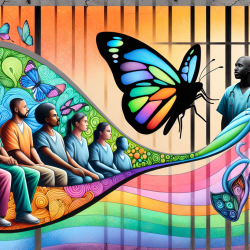Introduction
In the field of speech-language pathology and mental health services, understanding the nuances of psychosocial factors is crucial for improving therapeutic outcomes. A recent study titled Differences in psychosocial factors of mental health in an ethnically diverse Black adult population provides valuable insights into the diverse mental health needs of Black adults in the United States. This research highlights the importance of considering ethnic diversity within the Black population when addressing mental health care.
Key Findings
The study conducted a cross-sectional analysis of 269 Black adults, including African Americans, African immigrants, and Afro-Caribbean immigrants. It explored differences in psychosocial factors such as medical mistrust, stigma behavior, and willingness to use mental health services. Key findings include:
- African Americans with moderate to severe depression symptoms exhibited greater stigma behavior compared to those with minimal to mild depression.
- Immigrants showed higher levels of stigma behavior than African Americans across the depression spectrum.
- Non-U.S. citizens reported higher medical mistrust compared to U.S. citizens.
Implications for Practitioners
For practitioners in the field of speech-language pathology and mental health services, these findings underscore the need to adopt a nuanced approach when working with Black adults. Here are some actionable steps practitioners can take:
- Understand Ethnic Diversity: Recognize that the Black population is not monolithic. Tailor interventions to account for ethnic diversity, which may influence mental health experiences and service engagement.
- Address Stigma Behavior: Develop strategies to reduce stigma behavior, especially among those with higher depression severity. This may involve community education and awareness programs.
- Build Trust: Work on building trust with clients, particularly those who are non-U.S. citizens or have high levels of medical mistrust. This could involve culturally sensitive communication and involving community leaders in the therapeutic process.
Encouraging Further Research
This study serves as a pilot exploration of the heterogeneity within the Black population regarding mental health. It highlights the need for further research to understand the complexities of psychosocial factors and their impact on mental health care engagement. Practitioners are encouraged to participate in or support research efforts that explore these dimensions in greater depth.
Conclusion
Understanding the psychosocial factors influencing mental health in ethnically diverse Black adults is essential for improving therapeutic outcomes. By considering ethnic diversity, addressing stigma, and building trust, practitioners can enhance their effectiveness in delivering mental health services. To read the original research paper, please follow this link: Differences in psychosocial factors of mental health in an ethnically diverse Black adult population.










